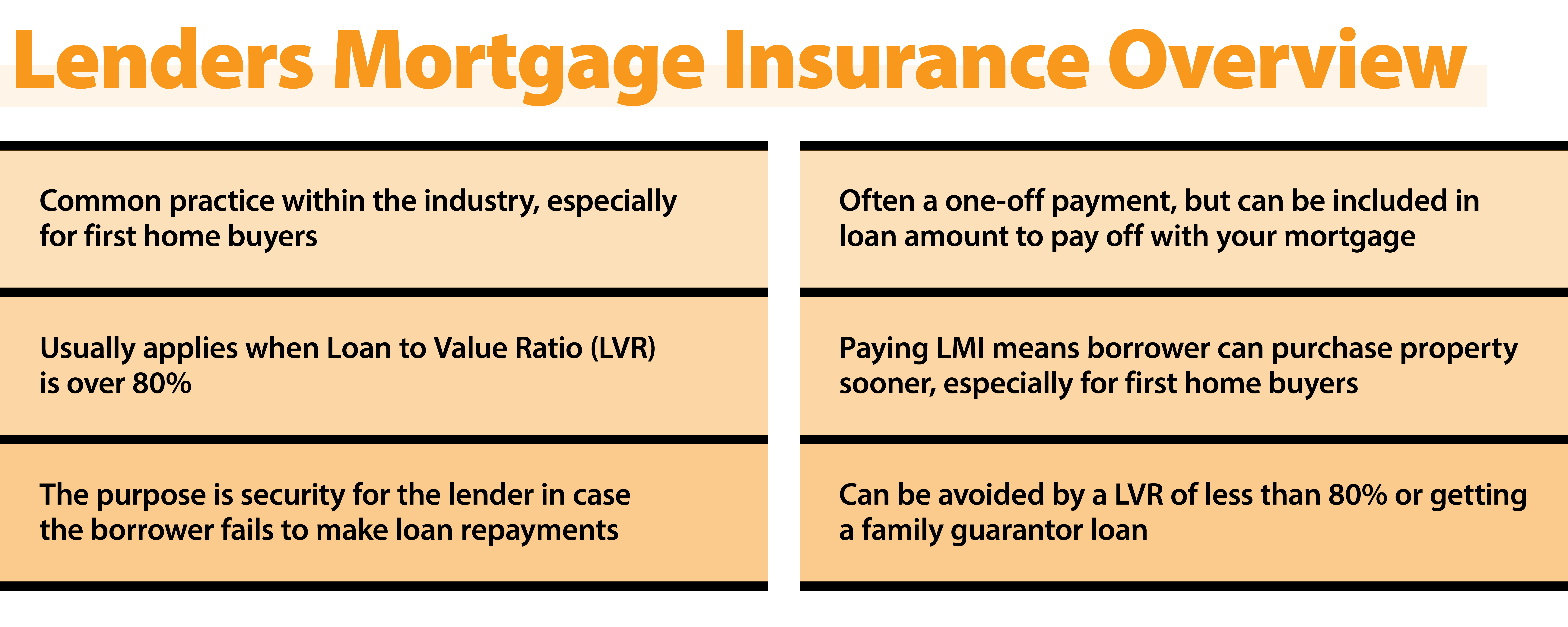While some view Lenders Mortgage Insurance (LMI) as being exclusively beneficial for lenders, we explore the value for first home buyers, plus how to buy without a 20% deposit and if you could even waive LMI completely!

Not to be confused with mortgage protection insurance (which is designed to protect the borrower), LMI is insurance that covers the lender’s risk within a residential mortgage transaction should the loan go into arrears and the borrower is unable to resolve the situation satisfactorily. LMI is a fairly common practice within the industry, particularly for new home buyers who may struggle to save a deposit. It allows an additional fee to be paid by the borrower and usually applies when the loan is more than 80% of the purchase property’s price.
The purpose of LMI is to ensure security for the lender in case the borrower fails to make loan repayments. Even though the actual house acts as security, the nature of the property market, like any investment class, means there is a chance that its value could decline, resulting in a financial loss for the lender.
The cost of the premium is dependent on several factors, such as the loan size and property value, and most insurers are flexible when it comes to the method of payment. It can either be a one-off upfront premium payment or that premium could be included in the overall cost of the loan and included in monthly repayments. It is not transferable, which means a new loan may require a new fee depending on how much equity the borrower has.
While it may appear that it is exclusively favourable to the lender, there is value to borrowers in paying the premium. Opting for LMI means it allows a borrower to independently purchase a property sooner than they otherwise might. LMI is the alternative to using a guarantor or having to save for a bigger deposit, both of which are not feasible options for many first home buyers.
A deposit of at least 20 per cent of the desired loan amount is required for a borrower not to be deemed ‘high-risk’. If you consider that the average price of a home in Adelaide is $553,036 in June 2020 that would mean a deposit of around $110,607. Properties in other states can be more expensive, like Sydney where the average house is upwards of $1.41 million, meaning at least $228,000 required. The beauty of LMI is that it buys time, which means borrowers with smaller deposits are able to enter the market sooner rather than later.
The major benefit of LMI is that it allows the dream of homeownership to become a reality for a lot of first home buyers. To see if this is the case for you, speak to our team at Acquired.
With property prices rising, it can seem an insurmountable task for new buyers to save a 20% deposit. That’s where insurance can help. Lenders mortgage insurance (LMI) may be an added expense, but it offers buyers the opportunity to dive into the property market earlier, without saving up an entire 20 per cent of the property’s purchase price as a deposit. While a 20% deposit generally provides a good buffer against any drops in property value over the life of a loan, LMI can also provide the same protection, meaning borrowers can purchase property with a smaller deposit.
For the borrower, it may seem LMI it is just another expense to cover. But insurance can mean that some buyers will be able to enter the property market with, for example, only a five per cent deposit saved. In the example above, a $500,000 property, this brings the deposit down from $100,000 to just $25,000.
And, if the market is hot and prices are rising rapidly, paying LMI so that you can buy now could be cheaper than taking the time to save a bigger deposit. In the time it takes to save a higher deposit amount, property prices may well have surged by more than cost of the insurance so, for some properties and purchasers, it can make good financial sense to purchase earlier even with the added cost of LMI, especially when you consider the rent that you would pay while you’re saving.
The insurance premium is generally a one-off payment, but you may be able to roll it into the loan amount so that you are paying for it month-by-month along with your mortgage. There can be a big difference between premiums paid if you have, for example, a 10 per cent deposit saved compared with a five per cent deposit, so it may well be worth trying to gather together some extra funds, even if you despair of reaching the full 20 per cent.
A little insider knowledge from our Acquired finance brokers can go a long way in helping you to find a loan that won’t require you to fork
out for LMI. Generally, there are a few ways that could work.
The purpose of LMI is to protect lenders should the borrower fail to make loan repayments when the LVR exceeds 80 per cent. When the loan
amount is more than 80 per cent of the value of the property being mortgaged, the risk to the lender of not recouping their costs, should
the borrower default, is increased. A higher deposit means a smaller loan amount and therefore a lower LVR thereby reducing the lender’s
risk. A loan of 80% or less of the property’s value is the key to avoiding paying LMI. Read more about LVR in our quick guide.
If you don’t have the financial capacity to meet a 20 per cent deposit but still want to avoid LMI, you do have the option of getting a guarantor
for your loan.
A close relative, such as a parent, sibling or perhaps a grandparent, may be eligible to act as a guarantor and they use the equity in
their property to help you secure yours and keep your total loan below 80%. In some instances, having a guarantor on your loan may mean
that you won’t need a deposit at all.

Acquired finance brokers are experts on the industry and the credit market. Investigating your options and working out whether to buy now or save extra deposit is a decision that a good finance broker can help you with.
First Home Buyer
10 Tips for Property Investors
Moving Checklist